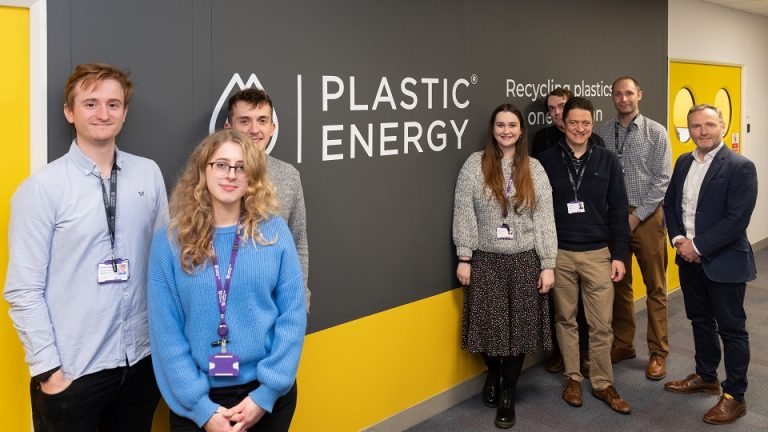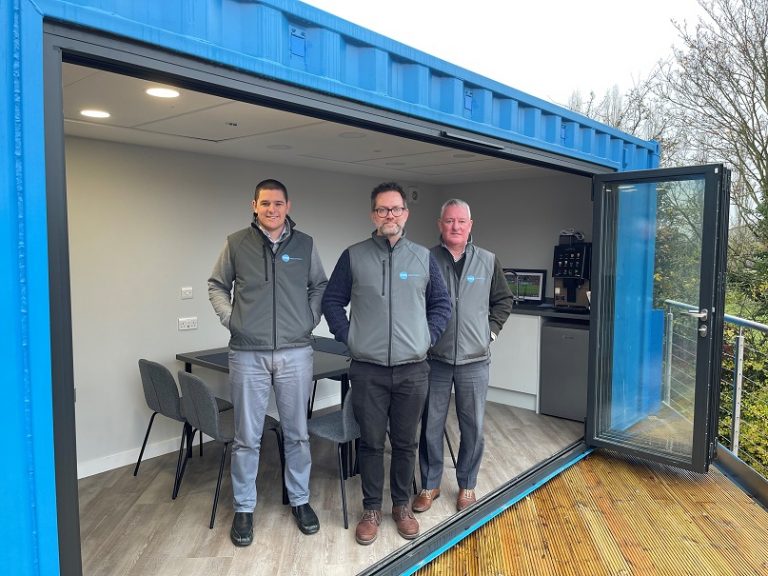Recycling technology leader opens new research and development labs at Loughborough University
Nottingham e-mobility business to lead project reviewing city’s approach to greening businesses’ supply chains
Dice Environmental makes significant appointments
Office refurbishments – four key things to consider
Health and Safety
The first and arguably most important thing you need to think about when refurbishing your office is health and safety. As well as general health and safety checks like trip hazards and ambient working temperatures, the recent pandemic has seen many more people looking for added health and safety measures. These could be elements such as PPE, sanitising stations and privacy screens. Alongside these there are also more minor alterations which, although low in cost and effort, can make a big impact on productivity. Using screen filters to reduce eye strain, offering more natural light sources, daylight bulbs or tubes will lower levels of eye strain. This can also reduce fatigue and will be beneficial to your employees’ health and well-being. For many people, most of their day will be spent in this space, so another factor to consider is the seating and workspace. If this is planned carefully, it will allow you and your staff to feel comfortable during their working hours. A well thought out ergonomic workstation will include a comfortable chair with lumbar support that allows feet to be flat on the floor. Ideally it would also include a desk with adjustable height, tilts displays and shelving within easy reach. Reducing the risk of employee discomfort could also reduce employee absences and potential workplace claims. It is a nice touch, where possible, to include a comfortable break out space. This could be in the same area sectioned off and with cosy, alternative seating, or in a different room that offers a change of scenery and setting. You may also want to consider an outdoor space when planning this area.Company Culture
It is important to factor in the ever-changing office eco system, with more people working from home than ever before. Part time office work needs to be considered when refurbishing your office space as people may not always be using the space provided at the same time. This may make your office refurbishment cheaper, as less people using the space at once calls for less desks and work equipment. Smaller shared kitchen areas and bathroom facilities will also reduce costs. As a result of this, hot desking may be an approach your company would like to take to maximise space efficiency. This means working spaces need to be designed to cater for all working needs rather than just being tailored to a specific individual. Considering modular furniture which can be altered to suit individual requirements will allow greater flexibility, as will furniture on lockable castors and furniture that can be adjusted in height. You may find that, despite hot desking, offering some form of storage space for personal effects will allow staff to still feel a sense of belonging and permanency when working in the office.Sustainability
As there is an increasing global focus on sustainability, this should be one of the main things you consider in your office refurbishment. Try looking at eco-friendly materials, recycled furniture or fittings and more sustainable construction. This could be things such as lowering your carbon emissions, or installing environmentally friendly heating systems. Incorporating solar panels into your build or refit will demonstrate your commitment to a healthier, more sustainable planet. Although pricey in the interim period due to the initial purchase and installation costs, they will not only help the planet but ultimately your energy bill at the end of each month too! It’s not just about being eco-friendly. Making your office socially and economically sustainable as well is also hugely important. This includes making a cost-effective space, whilst still having those little extras that make your office an enjoyable place to work.Budget
There’s no skirting around it – most office refurbishments are expensive. With all the different things to consider, this is probably the factor you will think about first and foremost. Your typical refurbishment will cost between £40-£70 per square foot. The cheapest option is of course to just repaint the walls and purchase new furniture, such as desks and chairs. The most expensive parts of your office refurbishment would be new kitchen areas, or anything more technical, such as lighting, electrical wiring and room partitioning. Office refurbishment can be a big decision for your company to make, so making sure it is done to the best standard is incredibly important. Ensure that the company refurbishing your space is 100% dedicated to creating your perfect work environment. Ask to see prior refurbishments so you can get a feel for their standard of workmanship and ask for recommendations or previous client reviews. A good refurbishment company will have these to hand and will be proud to share them with you. Get some inspiration for your office design on the APSS website.Mortgage Advice Bureau hit by “quick and far-reaching” consequences of mini-budget
These extreme market and lending conditions have “severely impacted” activity levels across all of the group’s product lines, with written business in October and November circa 50% below expected levels. The reduction in mortgage activity and new house sales is expected to persist until early 2023.
Mortgage Advice Bureau said that its financial result for the year ending 31 December 2022 will be impacted by the adverse market conditions, with adjusted profit before tax expected to be slightly below market expectations, with next year’s result anticipated to be considerably impacted. The company has also noted the placing of property portal Boomin into liquidation has led to a £2.8m non-cash write off for its investment.Peter Brodnicki, CEO of MAB, said: “The consequences of the so-called mini-budget have been quick and far-reaching. Overnight our market moved from being fairly stable and reasonably confident, to almost the polar opposite. The sudden and unexpected pace of mortgage rate increases, combined with the tightening of mortgage lending criteria, have resulted in some customers pausing both home-moving and re-financing plans.
“The recent Autumn Statement and the various Government changes prior to that have helped to stabilise markets. Although macro uncertainty remains for many reasons, we expect mortgage rates to continue to stabilise, allowing some customers to re-enter the home-moving market and also re-finance at more competitive mortgage rates than those seen in recent months.
“Despite the various market and political challenges, MAB remains very well positioned to grow its market share strongly through 2023. In more challenging housing markets although we may see a reduction in organic advisers our new AR recruitment performs strongly, so next year overall adviser numbers could remain flat.
“The re-financing opportunities in 2023 are significant, and with the technology enhancements we have delivered, MAB is in a better position than ever to optimise those opportunities. As expected, protection attachment rates have already started to improve in the current environment, and our focus to ensure that continues has never been greater. As we see in housing downturns, transactions are delayed, they are not lost.”
Government minister visits Leicestershire manufacturer to discuss trade opportunities
A global manufacturer and distributor recently welcomed a government minister to its UK headquarters in Leicestershire for a production and trade focused visit.
Kemi Badenoch MP, Secretary of State for International Trade, visited COBA Group, which specialises in the manufacture of thermoplastic products, at its production facility in Fleckney where more than a million products are manufactured each day.
Ms Badenoch was joined by Neil O’Brien, MP for Harborough, Oadby and Wigston, for the visit, which included a tour of the complex where 266 of COBA Group’s 405 UK employees are based, and a discussion with Mark Cooke, CEO of COBA Group, regarding post-Brexit international trade opportunities.
The MP for Saffron Walden saw COBA Group’s largest subsidiary, COBA Automotive, at close quarters, as the East Midlands-based business looks to diversify its offering, with a number of opportunities currently available to work on a variety of exciting automotive and plastic projects.
As part of the tour, Ms Badenoch was walked through the ‘tie-down’ production area, where a product category of COBA Group’s successful automotive seating portfolio is created.
The International Trade Minister and her team were shown around the whole production facility, where 1000 solar panels have recently been installed on the roof, with the expectation of reducing energy costs and COBA’s carbon footprint.
Ms Badenoch, who is also President of the Board of Trade, visited COBA Group as part of its long-term strategy to expand its operations in international markets and sustain noticeable export growth, with the business now supplying its products to more than 140 clients in 40 countries.
COBA Group’s manufacturing and distributing capabilities are increasing internationally, with COBA Automotive now operating two production plants in Slovakia and Romania.
The business has now been trading for 55 years, and runs 14 production facilities in Europe and Africa. It featured in the London Stock Exchange’s 2020 list of ‘1000 Companies to Inspire Britain’ and is a staple of Leicestershire’s Top 200 Companies.
Mark Cooke, CEO at COBA Group, said: “We were delighted to welcome Kemi Badenoch MP to Fleckney for a tour of our manufacturing facility. International trade is an important part of our business operations, so it was beneficial to share our recent experiences with her and hope they guide her somewhat as she seeks to establish the UK on a sound global trading footing post-Brexit.
“Managing the journey of our products, from their beginnings as individual components to the finished article that end up with our customers, whether that be in the UK or on mainland Europe, Africa or other parts of the world where we operate, is an ongoing challenge. We naturally always want to always improve in this area, so to relay our thoughts to Ms Badenoch and to see her so engaged and interested in supporting our efforts was great.
“Like so many of our counterparts, COBA Group has faced some challenging circumstances in recent times, but it was refreshing to have some really positive discussions about COBA Group’s importance within the East Midlands business community and beyond as a global manufacturer.
“We were pleased to be able to talk to Ms Badenoch about maximising COBA Group’s domestic trade opportunities, and to learn about her ongoing commitment to the UK plastering and automotive sectors.
“It was a privilege to welcome her to our Fleckney base, and post-visit, we’re excited to continue moving the business forward and keep ensuring that we’re going above and beyond for our clients by working smartly, providing a high-quality service at the best value possible, and exceeding their expectations.”
New tools to identify non-compliant business locations created to support regulation and enforcement
Alongside its work with the National Crime Agency, WIP – which includes researchers from NTU’s School of Social Sciences and Nottingham Business School – has also worked with the Gangmaster and Labour Abuse Authority, Office of the Director of Labour Exploitation, and the Responsible Car Wash Scheme to inform their work to improve standards and challenge illegal activity.












